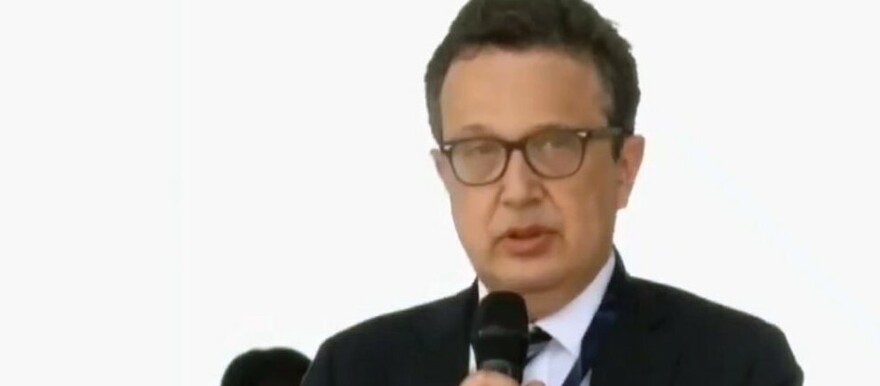U.S. Ambassador to South Sudan has said that twelve years after independence, and 18 years after the Comprehensive Peace Agreement (CPA), the people of South Sudan have yet to see the prosperity they anticipated would follow.
Amb. Michael J. Adler made the remarks while on Behalf of the Troika Embassies (Norway, the United States, and the United Kingdom) at the Inaugural National Economic Conference in Juba on Monday 4 September.
“Such prosperity can only come from economic growth of the type to be discussed at this conference, growth that is “diversified, inclusive, stable and sustainable.” Looking beyond this conference, we call upon the transitional government to demonstrate through its actions, that it views achieving this growth as a priority,” he pointed out. “To demonstrate that this is indeed the case, the transitional government must establish an environment that is conducive to effective development assistance and responsible private sector investment.”
“I regret to say that such an environment does not currently exist,” Amb. Adler added.
According to the U.S. envoy, such an environment will only emerge when the transitional government demonstrates the political will to meet peace commitments that are necessary so that a free, fair, and peaceful election can take place.
“It will only emerge when there is accountability for human rights violations, including gender-based violence, and measures to prevent corruption,” he said. “It will only come when there is transparency in the use of public revenue and prioritization of the use of that revenue based on the principle that public resources must be used to meet public needs.”
“For example, at present, the largest portion of South Sudan’s public including the majority of its oil revenue-is spent on roads, yet how much benefit have the South Sudanese people actually seen from this spending?” he rhetorically asked. “Could these funds be better used? What is the opportunity cost of the current pattern of spending?”
Amb. Adler gave a few examples of the cost of not using public revenue to meet other priorities as the low and non-payment of civil service and security sector salaries which affects government capacity and serves as primary drivers of criminality and corruption.
“The health sector relies overwhelmingly on international assistance, with only two percent of its financial support coming from the transitional government,” he said. “As more than 240,000 South Sudanese who were living in Sudan seek sanctuary in their home country, only US$3 million has been made available from public revenue for humanitarian response.”
“Let me be clear, the question of how the wealth of this country should be used is for the South Sudanese people to determine, not for me or other foreigners,” Adler qualified.
He said that however as representatives of donor countries, they owe it to both their taxpayers and to the South Sudanese people they seek to support to call on the transitional government to prioritize its use of public revenue in a manner that treats the South Sudanese people as its priority.
“This means the transitional government taking greater responsibility to: provide basic services to its citizens; pay public sector salaries on time, including those for health workers, teachers, and security forces, in a transparent and accountable manner; and increase its contribution to the health sector and to humanitarian assistance to its people who are in greatest need,” the envoy said.
Amb. Adler said the Troika countries have contributed substantial assistance to support the South Sudanese people for decades and that their support for the South Sudanese people’s aspirations for a better future remains strong.
“So is our conviction that the driving factors that obstruct economic growth in this country are in the hands of the transitional government to address. These factors can be reversed if the transitional government meets its peace commitments, introduces transparency and accountability, and prioritizes the use of public revenue to meet public needs,” he counseled. “By doing so, the transitional government will demonstrate that diversified, inclusive, stable, and sustainable economic growth-economic growth that can bring prosperity to South Sudan-is indeed a transitional government priority.”
The South Sudanese people deserve this. Donor countries expect this. The history of sacrifice that the South Sudanese people endured on their way to independence calls upon all to support this,” Adler added. “A path to a better and prosperous future requires this.”
The U.S. Envoy congratulated South Sudan’s basketball team for its recent exploits in Manila, Philippines but quipped that at the same time, he remains concerned that the funding allocated to the basketball team by the transitional government exceeds the amount that has been made available for humanitarian assistance.
“As I read the news and heard from South Sudanese friends, my thoughts turned to another time and place. I thought of the 1988 Olympics in South Korea. It was a time of great pride for South Koreans in their country’s place in international sports. But it was also a time of pride in so much more, due to South Korea’s evolution from an aid-dependent country emerging from its own very traumatic history of occupation and war to a major, prosperous world economy, a donor nation, and a model others aspire to follow,” he said. “The Olympics also occurred the year after South Korea held the election that established the strong and flourishing democracy its people enjoy today. It was widely noted that South Koreans who watched the Olympics in 1988 took pride in that as well.”
“So, while I extend my congratulations to South Sudan on the basketball team’s performance, it is my hope that the South Sudanese people will soon be able to take pride in their country’s democracy and prosperity as well,” Amb. Adler concluded.




